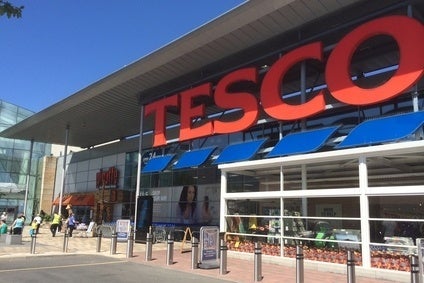
Tesco issued another profit warning this morning (9 December) that once again highlights the challenging task facing new CEO Dave Lewis. In an effort to build bridges with its suppliers, Tesco is moving away from a model that requires one-off payments from CPG manufacturers. This process will have a mixed outcome for the supermarket’s supply base, Katy Askew suggests.
Tesco buyers have long had the reputation for throwing their weight around in pricing negotiations. As the UK’s largest retailer, securing a Tesco listing delivers significant volumes – but historically the retailer has required suppliers to do certain things in return, including requesting one-off payments. Suppliers would reportedly be dropped if they refused to play ball.

Discover B2B Marketing That Performs
Combine business intelligence and editorial excellence to reach engaged professionals across 36 leading media platforms.
In October, Tesco revealed a GBP263m (US$424.6m) black hole in its books relating to these payments – euphemistically called “commercial income” – and how they were recorded by the retail giant. While the group’s accounting practices have been placed under the microscope, questions are also being asked about deeper issues such as Tesco’s culture and its relationship with suppliers.
All signals suggest Tesco’s interaction with the manufacturers is a fundamental question new CEO Dave Lewis seems intent on addressing. The former Unilever executive took the helm at Tesco in September, shortly before the accounting issue hit the headlines. Unveiling today’s profit warning, Lewis put Tesco’s supplier dealings front and centre.
The company is taking a “new commercial approach” that, Lewis hopes, will build “stronger long-term relationships with our suppliers” while at the same time “ensuring that revenue recognition is transparent and appropriate”. And the retailer said it had “retrained our entire team and begun the cascade with our suppliers”.
Lewis said: “Tesco is focused, and will continue to focus, on doing the right thing for customers. This means running our business in a way that everything we do creates sustainable value. Whilst the steps we are taking to achieve this are impacting short-term profitability, they are essential to restoring the health of our business. We will not engage in short-term actions that compromise in any way our offer for customers.”

US Tariffs are shifting - will you react or anticipate?
Don’t let policy changes catch you off guard. Stay proactive with real-time data and expert analysis.
By GlobalDataThe retailer said it now believed its group trading profit for the full financial year “will not exceed GBP1.4bn” – below the GBP1.8-2.2bn consensus range.
According to Cantor Fitzgerald analyst Mike Dennis, the new commercial approach Tesco is taking represents a “very big change” in the way the group interacts with suppliers. “Tesco has said it has changed its commercial trading policy, which we read as a move to less negotiated margin and one-off payments and more lower base prices. Tesco may need to pay suppliers sooner or cut back on its product range or both – all [this] needs to be renegotiated in a joint business plan and new terms of trade,” he told just-food.
While it looks likely the company will expect fewer pay-offs, it does not mean the firm will become a pushover in pricing negotiations. Especially given the price sensitive environment in which the retailer is operating.
The supermarket group has seen its market share erode, with competition rising as the discounters Aldi and Lidl continue to make inroads and Wal-Mart’s Asda takes a more aggressive stance on price. According to Kantar Worldpanel data for the 12 weeks to 9 November, Tesco saw the largest market share decline in the UK, falling 3.7%, against a market declining 0.2%.
Tesco is under pressure to regain its price leadership position while simultaneously investing in improved in-store execution. Some of the expected price cuts will be funded through an adjustment of Tesco’s own base margin. The group is likely to lean on its suppliers to help fund the rest.
For some suppliers, this will make strategic sense. The higher volumes involved will help reduce unit costs. The “strategic partnerships” Tesco wants to build will work to the benefit of both.
The approach mirrors the “new” tactic adopted by UK food maker Premier Foods plc, which after criticism has retreated over its requests for annual payments from suppliers as part of its “invest for growth” turnaround plan. Premier came under heavy media scrutiny after it featured on the BBC’s Newsnight programme last week, which described the arrangement as an example of so-called pay-and-stay practices.
One-off payments are certainly falling out of vogue in UK grocery thanks to widespread public backlash against the strategy, which is seen as unfair. The pressure, then, will shift to calls for suppliers to offer lower base prices.
According to Conlumino’s Neil Saunders the burden of lower pricing will likely be weighted to Tesco’s larger suppliers. “Tesco – and the other grocers – will look to some suppliers to help fund price cuts. However, the focus will most likely be on larger suppliers as smaller suppliers have less room for manoeuvre in terms of margins,” he tells just-food.
Given larger suppliers will be the chief beneficiaries of higher volumes, this seems a more equitable arrangement than one-off payments that have proven potentially crippling for SMEs. However, there is a kicker here. If Tesco does prune down its SKUs, it will likely be the smaller suppliers – that offer less favourable terms to the retailer – who will be first for the chop.





